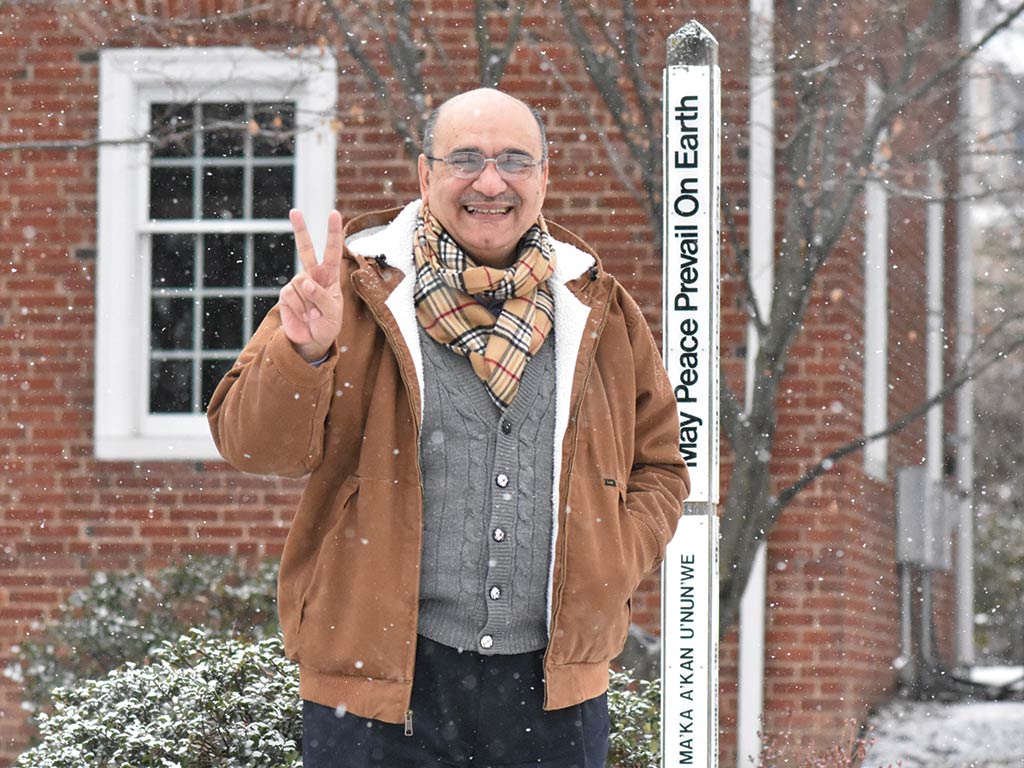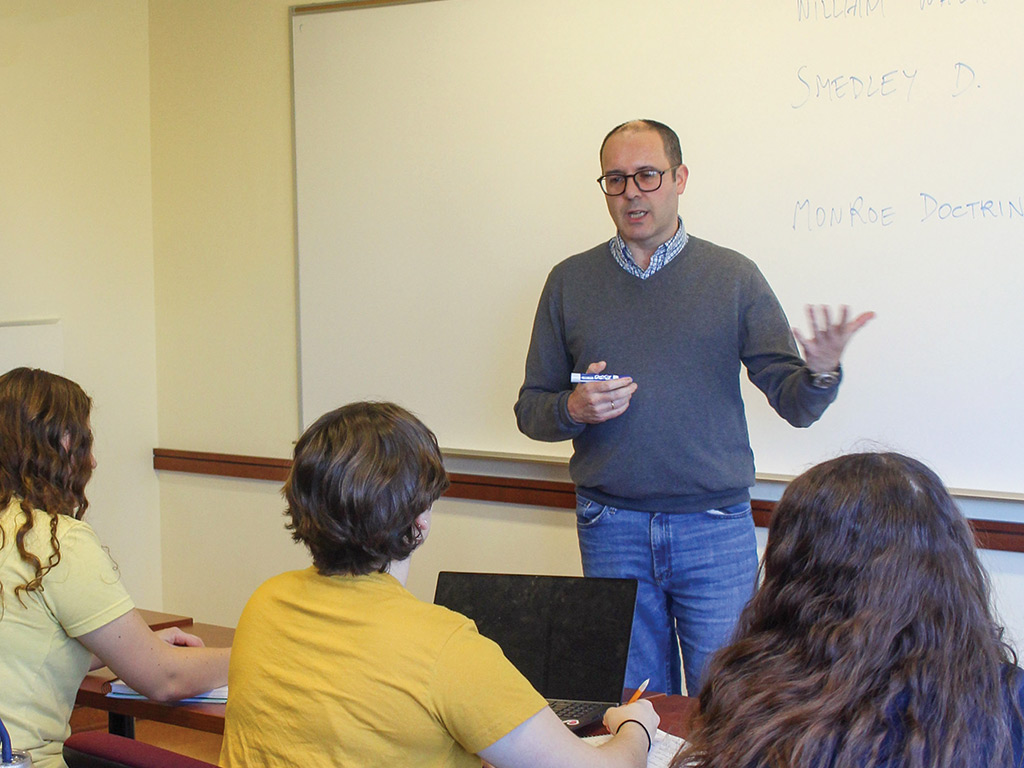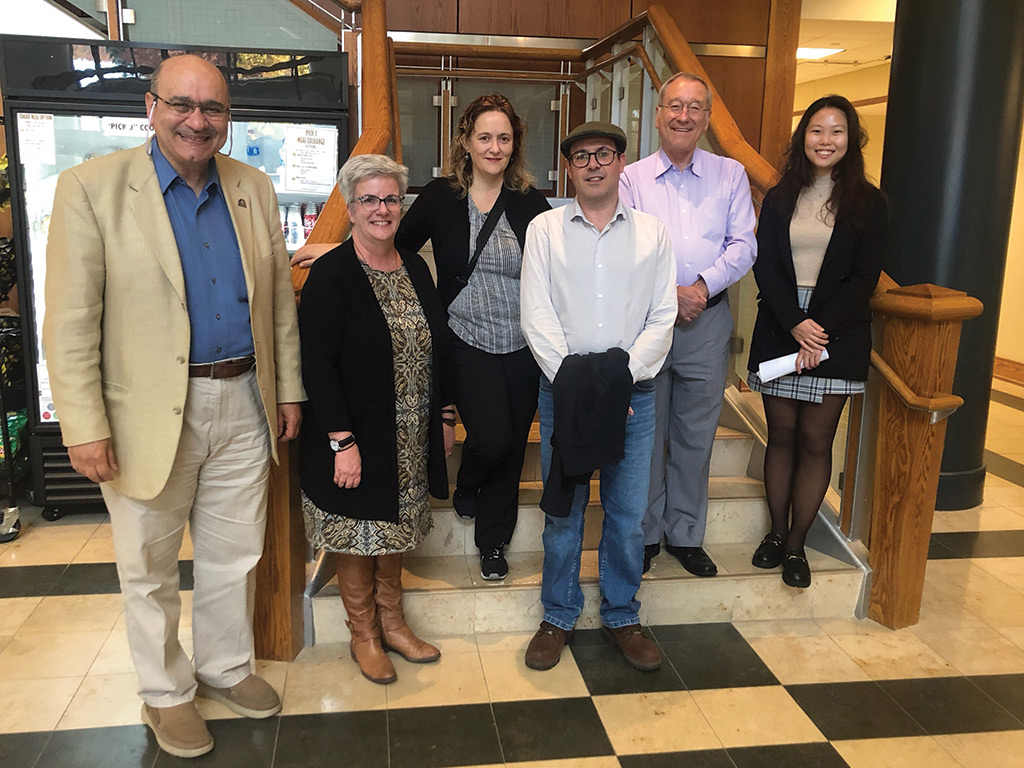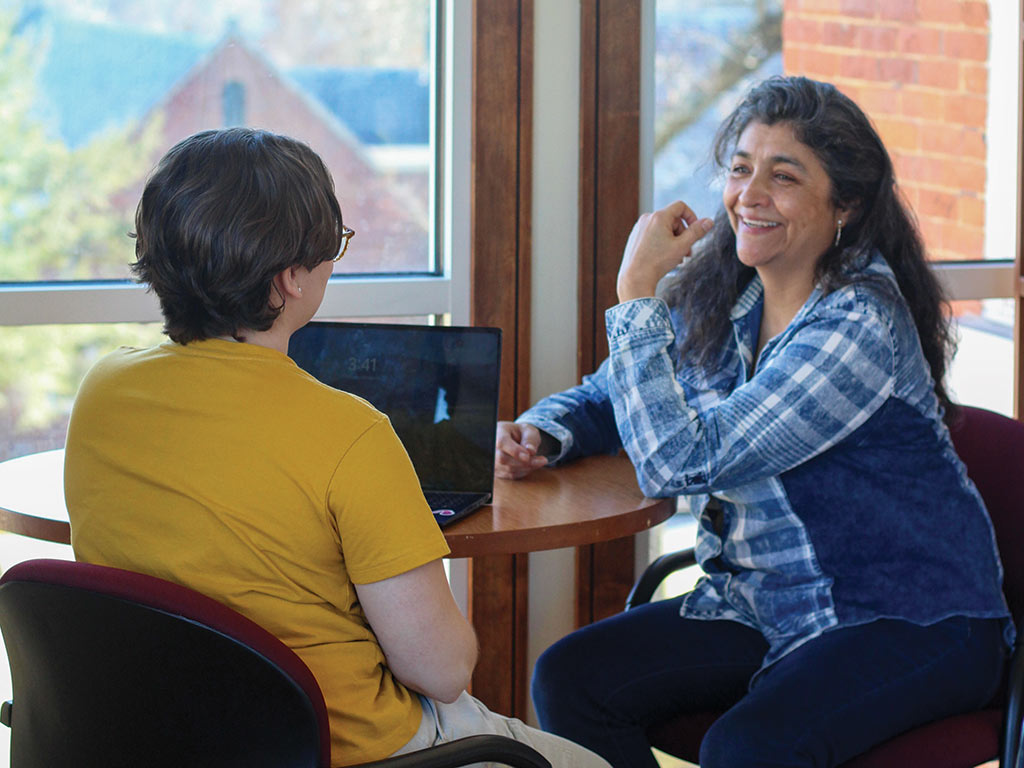To travel is to embrace the wonder of the new, the immersion in the unknown, and the power of connection. That power of connection, whether one is a student or a teacher, is at the heart of global education centered upon the lifelong process of increasing self-awareness, developing social skills and behaviors around diversity, and gaining the ability to advocate for others.
Juniata, a leader in international education, received the Simon Award for Comprehensive Internationalization in 2012 in recognition of faculty dedication, innovative approaches to internationalization, and institutional commitment to international education. This commitment to leadership and dynamism in response to a changing global environment includes hosting international visiting scholars through the Fulbright Commission, the Baker Institute for Peace and Conflict Studies, and institutional study-abroad exchange partners.
“Visiting scholars provide different experiences and perspectives from their home countries by contributing both in and out of the classroom and helping students develop essential cultural competencies,” said Jana Jaffa, director of international student and scholar services. “They enhance our culture and guide students to enter the 21st-century workforce.”
Students gain a broader appreciation of the value of their citizenship in the world through exposure to an increasingly global and diverse community as they share in the knowledge, perspectives, experience, and friendship provided through the presence of visiting scholars.
Each scholar brings unique academic and professional expertise and cultural capital they share with the Juniata community in every interaction. These relationships continue to grow and expand well beyond the scholars’ time on campus, sometimes developing into future study-abroad opportunities or a widened scope for the curricula of Juniata’s faculty. Faculty members in all disciplines benefit from the connections visiting scholars provide, allowing for virtual guest lectures and exploration of subjects from a cultural perspective.
In the Spring 2023 semester, Juniata is hosting several visiting scholars, including Dr. Adriana Gómez-Aiza, Dr. Amr Abdalla, and Dr. Carlos Sanchez-Fernandez. Each of these scholars brings unique academic and professional background and experiences to classrooms and campus, and all have become enthusiastic members of the Juniata community.
“You carry your culture with you, whether you intend to or not; it’s part of everything you do.”
Dr. Adriana Gómez-Aiza
Dr. Adriana Gómez-Aiza, Distinguished Visiting Professor of Politics and Fulbright-García Robles Mexico Studies Chair, comes to Juniata from the Autonomous University of the State of Hidalgo (Mexico). With expertise in physical anthropology and demography, Gómez-Aiza arrived on campus in January 2023 and teaches courses on Indigenous Rights in the Americas and Mexican identity, nationalism, and social and cultural belonging.
“Having the Fulbright Mexico Studies chairs at Juniata has been a wonderful addition for students. Not only do the students benefit from an international perspective and a taste of Mexico in the classroom, but our Mexico Studies Chairs bring a bit of Mexican culture to the entire campus community,” said Dennis Plane, professor of politics, who was a visiting scholar in Mexico in 2019. “For example, last year’s visiting scholar, Dr. Alberto Lozano, literally brought a taste of the cultural richness of Oaxaca to campus, including the opportunity to taste mole negro and mescal con sal de gusano de maguey. And Dr. Alejandro Herrán, our first visiting Mexican scholar, continues to work with Juniata students who travel to southern Mexico to learn about migration issues while being an eyewitness to the phenomenon. This year, Dr. Gómez brought a campus photography exhibit depicting ordinary Mexicans caught up in the Mexican Revolution. She also organized a roundtable discussion featuring scholars and activists concerned about indigenous rights in the Americas.”
In addition to learning about Juniata, Gómez-Aiza said she had to introduce herself to the liberal arts, a concept she is not used to at home. She was initially shocked that half of her politics class comprised non-politics students. Now, she relishes the challenge of sharing her expertise with those with little background while sharing her perspectives.
Gómez-Aiza observed that when one travels abroad, “you carry your culture with you, whether you intend to or not; it’s part of everything you do.” She believes three experts can teach the same subject, but because of their points of view, culture, and ways of communicating, three distinctly different experiences on the same topic would be offered. She described the cultural exchange as an enriching experience that helps everyone involved learn and grow.
She looks forward to continuing her relationship with Juniata scholars and students and working with another Fulbright scholar on a potential study abroad program.
“Amr is an amazing colleague, mentor, and a very effective teacher. His spirit and enthusiasm for the field of peace and conflict studies and his passion for teaching are contagious. Through real-life case studies and roleplay, Amr is helping our students understand the complex dynamics of conflicts that they experience daily and making them agents for positive social change.”
Ziaul Haque, Director of the Baker Institute for Peace and Conflict Studies
Dr. Amr Abdalla, Baker Institute for Peace and Conflict Studies Scholar in Residence, came to Juniata in the spring of 2022 from the United Nations-mandated University for Peace (UPEACE) in Costa Rica, where he is a professor emeritus. He brings a wealth of experience from his work worldwide, having visited more than 100 colleges and universities.
“Amr is an amazing colleague, mentor, and a very effective teacher. His spirit and enthusiasm for the field of peace and conflict studies and his passion for teaching are contagious,” said Ziaul Haque, Director of the Baker Institute for Peace and Conflict Studies. “Through real-life case studies and roleplay, Amr is helping our students understand the complex dynamics of conflicts that they experience daily and making them agents for positive social change. With his workshops, training, mentoring, and other on-campus engagements, Amr is making a huge difference in our community. We are truly blessed to have Amr teaching for us.”

Abdalla teaches courses on violent extremism and radicalization, mediation and peacebuilding, negotiations, and nonviolence, and intercultural peace and conflict. As part of Juniata’s campus community, he has been integral in coordinating conflict resolution and mediation workshops, organizing an international symposium on the war in Ukraine, and partnering with Stone Church of the Brethren for a workshop on violent extremism in Nigeria. Abdalla also serves as the academic director of the Office of Equity, Diversity, and Inclusion (EDI) and is collaborating with fellow faculty members on designing and implementing the First Year Foundations course. Abdalla said the visiting scholar experience is unique because it allows someone to share their knowledge and expertise without relocating permanently. “It’s a very good chance to be exposed to new things every day,” he said, “My experience is contributing something positive.” Creating a space for visiting scholars on campus provides opportunities for the visiting scholar and the host institution. “Everyone is a winner in this situation,” said Abdalla.
Dr. Carlos Sanchez-Fernandez, Assistant Professor of World Languages and Cultures, came to Juniata from the University of Seville (Spain) in the fall of 2021. He brought his family for a two-year stay.

“Having a visiting scholar has deeply enriched our department, broadened our course offerings, and provided added cultural activities for students. Carlos is an incredible historian, scholar, and language educator. He’s brought Spanish culture to us,” said Amy Frazier-Yoder, associate professor of Spanish. “He and his wife taught a packed Global Village crowd how to dance Sevillanas. Carlos presented olive oil tasting and lecture-meals on Semana Santa and religious freedom in Spain. Carlos has had a wonderful effect on our department. He encourages social gatherings, shares and talks with us about articles regarding world events, history, and changes in academia, and contributes helpful perspectives as we talk about language study and the liberal arts. He’s intellectually curious and has an incredible depth of knowledge.”

With a background in teaching Spanish history, art history, and Latin American history, teaching Spanish language courses has been a new experience and a learning exercise he finds challenging and rewarding. His focus on instructional excellence led to him joining Junior SoTL (The Center for Scholarship of Teaching & Learning), which “promotes professional development related to evidence-based practice in higher education” and endeavors to increase scholarly teaching at Juniata. As a member of this group, he learns from Juniata professors but has also brought his perspective as they work together to improve education in the ever-changing college classroom. Sanchez-Fernandez said there are only positives to be gained in these opportunities for cultural exchange, no matter the time. He described the experience as “rewarding and enriching” and providing opportunities to broaden horizons in tangible and intangible ways. Though Sanchez-Fernandez will be leaving Juniata and Huntingdon at the end of the spring semester, he looks forward to being a connection for future Juniata students who study at the University of Seville, where he works in the Centro Universitario Internacional.





